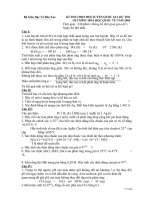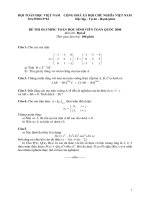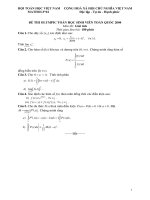Đề thi Olympic Toán học quốc tế BMO năm 2020
Bạn đang xem bản rút gọn của tài liệu. Xem và tải ngay bản đầy đủ của tài liệu tại đây (191.52 KB, 2 trang )
<span class='text_page_counter'>(1)</span><div class='page_container' data-page=1>
<b>UKMT</b>
<b>UK</b>
<b>M</b>
<b>T</b>
<b>UK</b>
<b>M</b>
<b>T</b>
<b>United Kingdom</b>
<b>Mathematics Trust</b>
British Mathematical Olympiad
Round 1
<b>Friday 29 November 2019</b>
© 2019 UK Mathematics Trust
Instructions
1. Time allowed: 31<sub>2</sub> hours.
2. Full written solutions – not just answers – are required, with complete proofs of any assertions
you may make. Marks awarded will depend on the clarity of your mathematical presentation.
Work in rough first, and then write up your best attempt. Do not hand in rough work.
3. One complete solution will gain more credit than several unfinished attempts. It is more
important to complete a small number of questions than to try all the problems.
4. Each question carries 10 marks. However, earlier questions tend to be easier. In general you
are advised to concentrate on these problems first.
5. The use of rulers, set squares and compasses is allowed, but calculators and protractors are
forbidden.
6. Start each question on a fresh sheet of paper. Write on one side of the paper only. On
each sheet of working write the number of the question in the top left hand corner and your
<b>Participant ID</b>, and<b>UKMT Centre Number</b>in the top right hand corner.
7. Complete the cover sheet provided and attach it to the front of your script, followed by your
solutions in question number order.
8. Staple all the pages neatly together in the top left hand corner.
9. To accommodate candidates sitting in other time zones, please do not discuss the paper on
the internet until 8am GMT on Saturday 30 November when the solutions video will be
released at
10. <b>Do not turn over until told to do so.</b>
Enquiries about the British Mathematical Olympiad should be sent to:
UK Mathematics Trust, School of Mathematics, University of Leeds, Leeds LS2 9JT
</div>
<span class='text_page_counter'>(2)</span><div class='page_container' data-page=2>
British Mathematical Olympiad Round 1 Friday 29 November 2019
<b>1.</b> Show that there are at least three prime numbers p less than 200 for which
p+2, p+6, p+8 and p+12 are all prime. Show also that there is only one
prime number qfor which q+2, q+6, q+8,q+12 and q+14 are all prime.
<b>2.</b> A sequence of integers a<sub>1</sub>,a<sub>2</sub>,a<sub>3</sub>, . . . satisfies the relation:
4a<sub>n</sub>2<sub>+</sub><sub>1</sub>−4a<sub>n</sub>a<sub>n</sub><sub>+</sub>1+a2<sub>n</sub> −1 = 0
for all positive integers n. What are the possible values of a1?
<b>3.</b> Two circles S<sub>1</sub> and S<sub>2</sub> are tangent at P. A common tangent, not through P,
touches S<sub>1</sub> at A and S<sub>2</sub> at B. Points C and D, on S<sub>1</sub> and S<sub>2</sub> respectively, are
outside the triangle APB and are such that P is on the lineCD.
Prove that AC is perpendicular to BD.
<b>4.</b> There are 2019 penguins waddling towards their favourite restaurant. As
the penguins arrive, they are handed tickets numbered in ascending order
from 1 to 2019, and told to join the queue. The first penguin starts the queue.
For each n > 1 the penguin holding ticket numbern finds the greatestm < n
which dividesn and enters the queue directly behind the penguin holding
ticket number m. This continues until all 2019 penguins are in the queue.
(a) How many penguins are in front of the penguin with ticket number 2?
(b) What numbers are on the tickets held by the penguins just in front of
and just behind the penguin holding ticket 33?
<b>5.</b> Six children are evenly spaced around a circular table. Initially, one has a pile
of n > 0 sweets in front of them, and the others have nothing. If a child has
at least four sweets in front of them, they may perform the following move:
eat one sweet and give one sweet to each of their immediate neighbours and
to the child directly opposite them. An arrangement is called <i>perfect</i> if there
is a sequence of moves which results in each child having the same number
of sweets in front of them. For which values of n is the initial arrangement
perfect?
<b>6.</b> A function f is called <i>good</i> if it assigns an integer value f(m,n) to every
ordered pair of integers (m,n) in such a way that for every pair of integers
(m,n) we have:
2f(m,n) = f(m −n,n−m)+m+n = f(m +1,n)+ f(m,n+1) −1.
Find all good functions.
</div>
<!--links-->
<a href=''></a>
<a href='http://\UKMTweb '>www.ukmt.org.uk</a>









